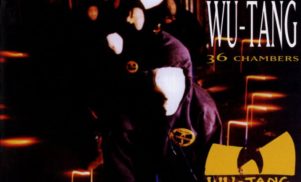To mark two decades of Enter the Wu-Tang (36 Chambers), yesterday we investigated nine of the myths and legends spawned by the larger-than-life crew. Today, FACT writer Laurent Fintoni thinks back to his childhood on the French Riviera to reflect on an album that broke through hip-hop’s geographical boundaries.
Wu-Tang Clan’s debut album turned 20 yesterday.
In four days I turn 34. It’s been a part of my life for more than half of it. I can’t tell you a story about this undisputed rap classic that wouldn’t have already been told. Unless I told you my story of 36 Chambers: the story of how a record, part of the long term plan by an ambitious MC, producer and businessman from the ghettos of New York City, impacted the life of a French-Italian kid growing up on the French Riviera thousands of miles away. And how that album changed that kid’s life forever.
Memories are hazy as to when I first heard the album or any of its songs. It’s funny, because I always have a precise memory of when things happened, but that seems to only apply to the parts of my life other than music. With music I often get years confused, especially when it’s music that has become a part of me. What I clearly remember is how I acquired the CD version of the album. My step-mom used to work for a publishing company in the south of France and they had an order catalogue which included CDs imported from the States. It must have been late ’94, because I ordered a bunch of other CDs with it that weren’t out until then. I played the Wu-Tang CD to death. I taped it and played those cassettes to death. From around ’94 until I left for England in ’98, rap defined every living moment of my life, and the Wu-Tang debut and follow-up solo releases were a massive part of that.
Like thousands of other kids before and after me, rap gave me an identity. Perhaps most importantly it gave it to me at a time when I needed it, a time when the borders of my world were growing thanks to my multicultural background. I loved the English language and I loved America, I loved basketball and I loved rap music and hip-hop culture. I loved it all from the comfort of my city’s streets, buses, school and bedroom, nestled in the Bay of Angels, one of the most iconic locations in France’s landscape. Thinking back on that makes me realise how fucking bizarre that situation was. Yet also perfectly logical.
I spoke English, and understood it relatively well for a kid who wasn’t technically born with it, but it took me years to realise just how much of this album’s lyrical subtlety and realism was lost on me at the time. The lyrics from 36 Chambers, and other classics of the time, became engrained in my subconscious. I could rap along, badly, to all the songs on the album, but could only really understand a small portion of it all. Lyrically, I’ve spent the past 20 years discovering and finding new understanding in the words and sentences. It’s testament to the album’s power and legacy, but also to the fact that hip-hop is a truly transformative force that knows no geographical boundaries.
Here I was, a white kid from mixed backgrounds living in the south of France and modelling my entire being on a music and culture that emanated from a place I dreamed about. 36 Chambers was like oil thrown onto the fire that fuelled my growing identity. It was like all the era-defining albums I’ve heard previous generations talk about. I didn’t know it at the time, but I know I felt it. I remember what it felt like to rap along to those songs in my head, listen to them on my Walkman on the bus, or on my shitty bedroom stereo. I remember the looks of incomprehension on my friends’ faces when I talked about it. I remember feeling the energy and rawness in the music that have come to define the album and its impact on hip-hop and the world. It’s the same energy I feel every time I hear it.
Hip-hop was coming out of its teens when Wu-Tang emerged, and while the album has an important sonic (and business) legacy, I think it’s important to underline its legacy as a vehicle for spreading the culture that birthed it. I almost feel like it’s my duty as the person I am, and was, to underline that fact. 36 Chambers not only helped shape my identity but also came at a time when the French hip-hop scene began to enter its own golden era. And that’s when I began to see hip-hop as more than an American cultural import and instead began to understand it as a culture that belonged to all of us, regardless of location, creed or background. I’m sure I’m not the only non-American white kid to feel this way.
There are many rap classics. Though only a few hold the power that 36 Chambers did. Only a few have had their lyrics become part of hip-hop kids’ lives. At university my friend quickly cemented the ‘short arms and deep pockets’ line as the de-facto ‘stop being tight’ equivalent. The C.R.E.A.M anagram has come to be a part of our collective understanding of the world we live in. Most recently I was speaking to B+ in Los Angeles, who quoted a line from ‘Protect Ya Neck’ (“Who’s your A&R? A mountain climber who plays an electric guitar?”) to summarise a point he was making about the industry.
If you’re a hip-hop kid born within a certain time frame, 36 Chambers is that shit in your bloodstream. Thanks, you old dirty bastard.






































